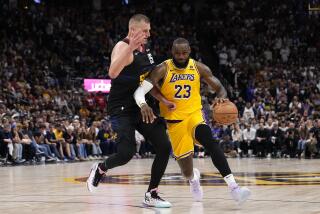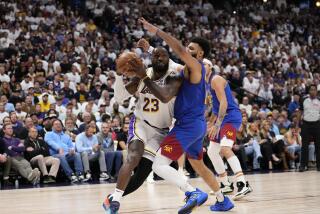Pau Gasol is being unfairly scapegoated
- Share via
As the final minute approached, Pau Gasol pulled Kobe Bryant to the side.
The Lakers forward suggested with his body language that he would run a pick-and-roll for the Black Mamba. Gasol would flash up top, roll to the post and either drain a jumper or attack the basket. Bryant nodded in agreement. After all, the Lakers had struggled throughout the fourth quarter in handling the Thunder’s efforts in fronting Andrew Bynum in the post. Bryant, himself, also had been having trouble freeing himself for open looks.
Once Gasol received the ball, however, he did the exact opposite — he passed. Kevin Durant then stole the pass and drained the winning three-pointer. After the Lakers’ 103-100 Game 4 loss Saturday to Oklahoma City, Gasol lamented not shooting the ball. Bryant criticized Gasol for not shooting the ball. And it’s possible that Lakers fans’ lasting image of Gasol this off-season will involve him not shooting the ball.
There was no excuse for that. But clearly, Gasol is being set up to be the scapegoat for unfair reasons.
He’s taking a huge amount of blame from Bryant and fans after the team fell to a 3-1 deficit to the Oklahoma City Thunder in the Western Conference semifinals. Yet Bryant’s the one who missed the potential game-tying three-pointer and went two-of-10 from the field in the fourth quarter.
But Gasol could soon become seen, if he hasn’t already, as the main offender for the Lakers’ playoff unraveling for the second consecutive year. Yet Andrew Bynum’s lack of effort proved the largest factor in all the Lakers’ first-round losses to Denver. Bryant’s trigger-happy tendencies proved the largest factor in the Lakers’ Game 2 and 4 losses to the Thunder.
It wouldn’t be surprising if Gasol is dealt this off-season. After all, he’s been the subject of trade rumors all season ever since the NBA rejected the original Chris Paul deal. Considering that the Lakers want and need to avoid the harsher luxury-tax penalties stemming from the new labor deal, Gasol’s remaining two-year, $38-million contract appears too burdensome.
Should this become Gasol’s last season as a Laker, however, the final verdict on his effort in the 2011-12 campaign shouldn’t solely focus on his drop in play. It should center on the Lakers’ failure to fully utilize his talents.
Some of it is circumstantial.
Even if Lamar Odom went off the deep end, the Lakers still miss his presence after trading him. He could play multiple positions, ranging from directing offense at the top of the key or operating around the high post. Considering Gasol’s versatility, he seemed the perfect fit in filling that role.
Most of it is by design.
Mike Brown’s system demands that Gasol play more of a facilitating role to complement Bynum’s post presence, allowing Bryant to move off the ball. Even with Ramon Sessions playing more of his possessions on pick-and-roll sets (41.5%) than Derek Fisher ever did (15.5%), Gasol is mostly asked to run the Lakers’ offense through the high post. No plays are designed for him. So any looks that he receives strictly have to come from his mid-range jumper or by driving on his own to the basket.
All season long, Brown and Bryant have said that Gasol needs to be more aggressive and play more selfishly. But how realistic is it to expect Gasol to produce the same offensive numbers as he’s done in previous seasons when his role has been drastically reduced? Say all you want that Gasol would be better served adopting Jordan Hill’s mentality in scrapping for hustle plays. But how realistic is to expect Gasol to do that when he’s being asked to operate far from the basket?
And yes, some of it is Gasol’s fault too.
Bryant and Brown are right that Gasol has to play more aggressively. Unlike what he did with late-game pass that led to a turnover in Game 4, Gasol usually takes open jumpers. Rarely does he attack the basket. Only occassionally does he provide enough intensity on defense.
But to pin Gasol as the Lakers’ main problem is simply unfair. To what degree has Gasol’s inconsistent aggressiveness actually significantly hurt the team? His three-points on one-of-10 shooting and three rebounds in the Lakers’ Game 6 loss to Denver remains the lone exception.
Meanwhile, there’s been more egregious problems plaguing the Lakers. Bryant’s high-volume shooting has proven both a blessing and a curse. Bynum’s effort level can seemingly fluctuate every day, an unsettling reality given his large role on the team. The Lakers’ outside shooting has stayed unpredictable.
Gasol has had to adapt to all those circumstances. He’s maintained professionalism and loyalty to an organization that tried trading him. He’s proven instrumental in setting up Bynum on the block. The lack of consistent perimeter players has required Gasol to be stationed away from the post so he can help facilitate and space the floor.
And that’s why it remained so disappointing Gasol passed up on his chance to shoot in what could’ve been a game-winning play. It would’ve marked his first field-goal attempt in the fourth quarter. It would’ve prevented Bryant from calling him out. It would’ve provided another reminder of his value to the Lakers even in a fluctuating role.
That didn’t happen. Instead, he’s being scapegoated and his standing on the team appears more diminished.
RELATED:
Bresnahan’s take: Let the hyperbole begin for Game 5
Lakers have got next ... but beyond that, who knows?
Email the Lakers blog at [email protected]. Follow the Lakers blog on Twitter.
More to Read
All things Lakers, all the time.
Get all the Lakers news you need in Dan Woike's weekly newsletter.
You may occasionally receive promotional content from the Los Angeles Times.








